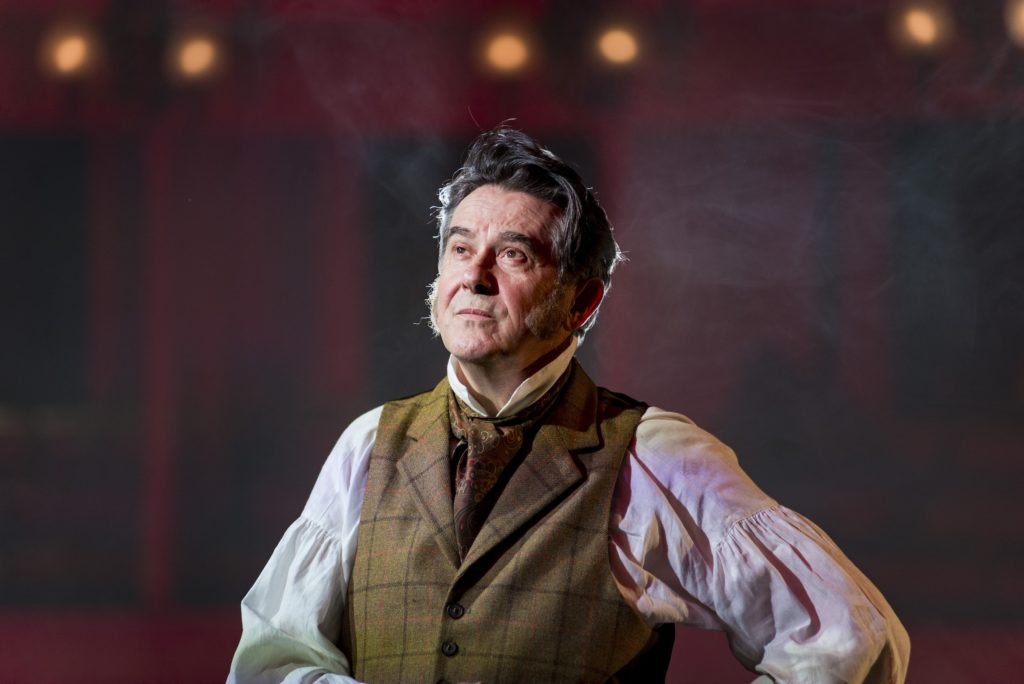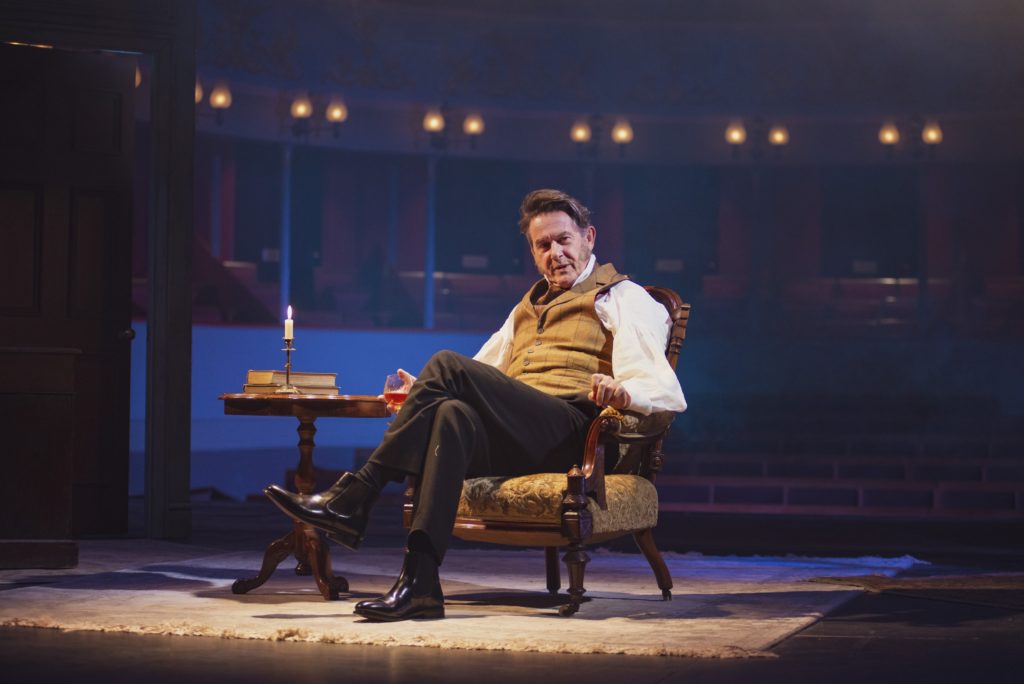
ADRIAN Lukis played George Wickham in the BBC’s television adaptation of Pride And Prejudice 26 years ago this very month.
Time, he says, to set the record straight about Jane Austen’s most charmingly roguish character in his one-man play Being Mr Wickham, co-written with Catherine Curzon.
This is the chance to discover the vilified Wickham’s version of some very famous literary events. Such as? What really happened with Darcy? What did he feel about Lizzie? What went on at Waterloo? Not to mention Byron.
Directed by Guy Unsworth and designed by Libby Watson, the Original Theatre Company’s 75-minute touring production visits York Theatre Royal from Thursday (14/10/2021) to Saturday.
From the company that brought Ben Brown’s political drama A Splinter Of Ice to the Theatre Royal in July comes Being Mr Wickham, wherein Lukis’s Mr Wickham is on the eve of his 60th birthday and wants to lift the sheets on exactly what happened 30 years on from where Jane Austen left him.
“I’m thrilled to be reunited with my old friend, George Wickham,” says Lukis, who starred with Colin Firth’s headline-grabbing Mr Darcy in Andrew Davies’s adaptation of Austen’s 1813 novel.
“Having spent years defending Wickham’s dubious reputation, I look forward to finally setting the record straight, with the assistance of the immensely talented Original Theatre Company.”
Rarely off the small screen, Lukis’s TV credits take in Channel 4’s Feel Good, the 2019 mini-series A Christmas Carol, Vera, Poldark, Bulletproof, Collateral, The Crown, Red Dwarf, Grantchester, Black Mirror, Blair Toast in Toast Of London, Downton Abbey, New Tricks and Death In Paradise.
He also stars in the new Netflix series Anatomy Of A Scandal, set to be streamed this year, and has had film roles in Judy, Dolittle, City Slacker and Bertie & Dickie.

Now he is touring Being Mr Wickham after theatre parts inThe Price(Theatre Royal Bath), The Seagull (Chichester Festival Theatre/ National Theatre) and Versailles (Donmar Warehouse).
Here, Adrian Lukis gives CharlesHutchPress the inside track on Being Mr Wickham.
What inspired you to revisit the character of Mr Wickham?
“When I turned 60 a few years ago, I started to wonder what it would be like for a man such as Wickham, who has been a rake and a ne’er-do-well, surviving on his looks and his wits, to have to deal with getting older.
“I started to look at it with Catherine Curzon, who is an expert on the historical side of things, and read everything about Wickham and Pride And Prejudice I could get hold of. I found myself discovering how much I enjoyed the process of researching and writing. Once I started, it just went like a storm.”
Given that the details of Wickham’s life are sketchy in the novel, how did you fill in the blanks?
“Firstly, I looked at the way he is described. For example, Darcy says he has led a dissolute life in London, so I thought, ‘well what really happened?’. I’ve also made up stories based on the historical facts and imagined an entire life for him above and beyond the book.
“At one stage, he enters a private club and gets into a punch-up, but it’s based on a real place called Watier’s Club in St James’s [London]. I also wanted to explore things such as what he really thinks of Elizabeth Bennet; what he really thinks of Lydia. These questions were really interesting to me.”

Austen depicts him as such a rogue, was it therefore important to fight his corner in the play?
“Absolutely. My premise was that people don’t tend to see themselves through a bad lens, and there are always two sides to a story. I could have written him like Flashman – an out-and-out bounder who just doesn’t care – but something I took very strongly from the book was that Wickham is plausibly a nice man.
“He is always described as being charming and amiable, rather than someone who’s constantly plotting and twirling his moustache. He admits he does some bad things, but turns it on the audience and asks, ‘have you led a blameless life?’.
“Also, he makes the point that life would be very dull without any rogues. I’d much rather spend an evening with him than with Darcy!”
How would Wickham be thought of in today’s society?
“It’s an interesting question. He would probably be labelled in contemporary terminology a bit of a ‘player’, and I think we all know men like that, but you have to view him in the context of his time. In Austen’s day, men who were not the first son had to set their cap at a wealthy heiress.
“That was a social pressure that we don’t really have today, so for a man with looks and charm, like Wickham, it made sense to try his luck with women, rather than going into the clergy.
“It would certainly be different today, although I think we are living through a very moral period, much more so than when I was growing up in the 1970s. So perhaps he would still be considered a scoundrel.”
What are your memories of playing Wickham first time round? Did you have any idea that the BBC series would become such a phenomenon?
“No idea at all; I don’t think any of us did. We knew it was a big production, and I thought the script was terrific, but we had no inkling of whether it would be a success. In that sense it was just another job.

“I remember writing to Colin Firth shortly after it came out, when he’d gone off to do some filming in South America, and saying words to the effect of ‘you have no idea what’s going on back home, this series has gone through the roof and you’re famous’.
“That being said, a few weeks later we went for a pint together in London, and I thought we would get absolutely mobbed – Darcy and Wickham out together -but nobody recognised us!”
Were you always drawn to acting and what about writing?
“My father was in the Royal Marines and I was initially brought up in Australia, where I didn’t have much chance to try it out, but when I came to England in the 1960s and was sent to public school, suddenly theatre was available to me and it was like being struck by a thunderbolt.
“I fell in love with it. My whole life soon became about being in school productions and when I was 17 I wrote my first play. At the time I thought I might be a playwright, so it’s nice I’m finally getting a chance to do it at 64!”
While on the subject of writers, what might Jane Austen have made of your reimagining of George Wickham?
“That depends on how you view her politics. She has been called all sorts of things, from a radical feminist to a staunch Methodist, but I think it’s safer to assume she was something of a small ‘c’ conservative.
“So, she probably would have disapproved of Wickham and seen him as being a rather weak and vapid young man, but I hope if she were to see this production, she would say, ‘good for you, you haven’t consigned him to the scrapheap and have found mitigating factors for his behaviour’.
Original Theatre Company presents Being Mr Wickham, York Theatre Royal, Thursday to Saturday, 7.30pm plus 2.30pm Saturday matinee. Thursday’s performance will be followed by a 15 to 20-minute question-and-answer session. Box office: 01904 623568 or at yorktheatreroyal.co.uk
